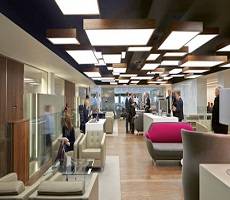January 6, 2014
New SkyCycle route proposed to ease Capital’s transport network congestion
 Demand for London-based workplaces is increasing, but the capital’s transport network is at capacity and ill equipped for a predicted population growth of 12 per cent over the next decade. Despite the Mayor’s efforts to encourage more cycling in the capital, a recent series of accidents has raised concerns about its safety. Architects Foster + Partners together with Exterior Architecture and urban planners Space Syntax have come up with a proposed solution, the SkyCycle network. This consists of a wide, secure deck constructed above the existing suburban railway corridors, to provide over 220 kilometres of safe, car free cycle routes which can be accessed at over 200 entrance points. Each route can accommodate 12,000 cyclists per hour and will improve journey times by up to 29 minutes. (more…)
Demand for London-based workplaces is increasing, but the capital’s transport network is at capacity and ill equipped for a predicted population growth of 12 per cent over the next decade. Despite the Mayor’s efforts to encourage more cycling in the capital, a recent series of accidents has raised concerns about its safety. Architects Foster + Partners together with Exterior Architecture and urban planners Space Syntax have come up with a proposed solution, the SkyCycle network. This consists of a wide, secure deck constructed above the existing suburban railway corridors, to provide over 220 kilometres of safe, car free cycle routes which can be accessed at over 200 entrance points. Each route can accommodate 12,000 cyclists per hour and will improve journey times by up to 29 minutes. (more…)


























October 28, 2013
Global urbanisation trends present UK cities with new opportunities
by Charles Marks • Comment, Environment, Property, Technology
(more…)